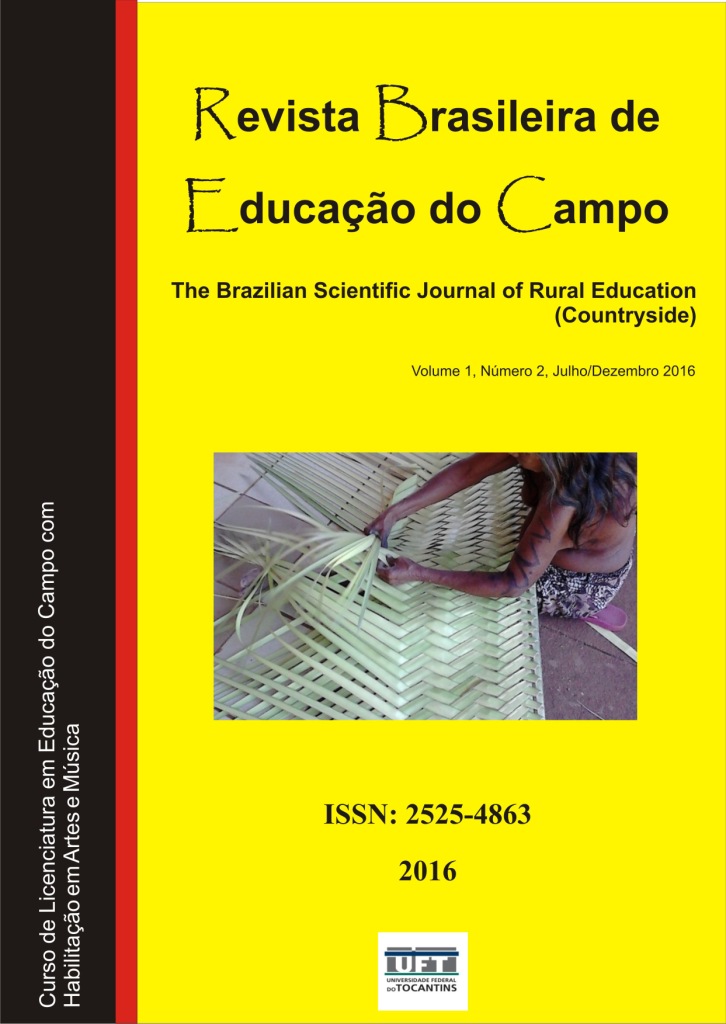The challenges of education in Mozambique in relation to the agrarian question and agricultural
DOI :
https://doi.org/10.20873/uft.2525-4863.2016v1n2p572Mots-clés :
Posse de Terra, Sistema de Produção Agrícola., Direito de Uso e Aproveitamento de Terra, Sistema de Produção AgrícolaRésumé
ABSTRACT. In Mozambique, the debate on land and agriculture issues is little massiveness, as yet, in the 41 years of independence is still unable to pass from words to practice on the importance that evokes for agriculture. The neglect of land and agricultural issues is paradoxical, taking into account many factors, including the number of people that their survival is closely linked to agriculture and the contribution of agriculture in gross domestic product. Indeed, more recent data estimate that about 3.826.913 individuals who have as their main occupation agricultural production of small scale. The lack of inclusion in the debate on these issues puts the government to set plans that do not meet domestic demand, especially in regard to meeting the food needs, availability of raw materials, and reduction of external dependence on wage labor supply. Mozambicans are still on the margins of its development agenda, anchored on foreign investment in mining, tourism and agribusiness. The government promotes international capital inflows that need extensive areas of land to accommodate their interests.
Téléchargements
Références
Assembléia da República. (2002). Legislação Sobre Terra Lei nº 19/97 Regulamento da Lei de Terras Decreto nº 66/98. Imprensa Nacional, Maputo.
Castel-Branco, C. N., et al. (Org.). (2015). Questões sobre o desenvolvimento produtivo em Moçambique. IESE. Maputo.
Castel-Branco, C. N., et al. (Org.). (2015). Desafios para Moçambique. IESE. Maputo.
Haesbaert, R., & Gonçalves, C. W. P. (2006). A nova des-ordem mundial. Editora UNESP.
Haesbaert, R. (1997). Des-Territorialização e Identidade: a rede gaúcha no nordeste. Editora EDUFF.
Marshall, B. (S/D). Tudo que é Sólido Desmancha no Ar: A Ventura da Modernidade.
Martins, J. S. (1996). O tempo da fronteira. Retorno à controvérsia sobre o tempo histórico da frente de expansão e da frente pioneira. Tempo Social. Rev. Sociol., 25-70.
Marx, K., & Engels, F. (2005). Manifesto Comunista. Trad. Álvaro Pinto Biotempo.
Mosca, J. (1996). Evolução da agricultura moçambicana no período pós-independência. ISA, Lisboa. Documentos de Trabalho, (3), 51.
Muchangos, A. (1999). Moçambique: Paisagens e Regiões Naturais. Maputo.
República de Moçambique. Conceito, Princípios e Estratégia de Revolução Verde em Moçambique. MINAG.
Negrão, J. (2003). Como Induzir o desenvolvimento em África? O Caso de Moçambique. O economista, (3), 39-75.
Tschirley, D. L., & Benfica, R. (2001). Setor Familiar Agrícola, Mercado de Trabalho Rural e Alívio da Pobreza Rural em Áreas com Abundância de Terras em África: Evidência de Moçambique. Direção de Economia. Relatório de Pesquisa, (41), p. 28.
Saquet, M. A., Sposito, E. S., & Ribas, A. D. (2004). Território e desenvolvimento: diferentes abordagens. Editora UNIOESTE.
Inocêncio, M. E. (2012). Geopolítica e Redes de Poder: Uma Proposta Metodológica para as Pesquisas de Campo ano cerrado Brasileiro. Editora UFU.
Mosca, J. (1996). Evolução da agricultura moçambicana no período pós-independência. ISA, Lisboa. Documentos de Trabalho, (3), 51.
Raffestin, C. (1993). Por Uma Geografia do Poder. São Paulo: Ática S. A.
Sitoe, T. A. (2010). A nova Revolução Verde Africana: de que forma ela pode contribuir para erradicar a fome e a pobreza na África. Revista Desenvolvimento em Questão, 8(15), 39-70.
Prosavana. (2013). Elaboração do Plano Diretor do Desenvolvimento Agrícola no Corredor de Nacala: nota conceitual. Maputo. Anais eletrônicos. Disponível em: http://prosavana.gov.mz Acesso em: 3 jun. 2014.
Negrão, J. (2000). Sistemas costumeiros de acesso à terra em Moçambique. Relatório Nacional de Desenvolvimento Humano. Maputo.
Téléchargements
Publié-e
Comment citer
Numéro
Rubrique
Licence
Proposal for Copyright Notice Creative Commons
1. Policy Proposal to Open Access Journals
Authors who publish with this journal agree to the following terms:
A. Authors retain copyright and grant the journal right of first publication with the work simultaneously licensed under the Creative Commons Attribution License that allows sharing the work with recognition of its initial publication in this journal.
B. Authors are able to take on additional contracts separately, non-exclusive distribution of the version of the paper published in this journal (ex .: publish in institutional repository or as a book), with an acknowledgment of its initial publication in this journal.
C. Authors are permitted and encouraged to post their work online (eg .: in institutional repositories or on their website) at any point before or during the editorial process, as it can lead to productive exchanges, as well as increase the impact and the citation of published work (See the Effect of Open Access).














